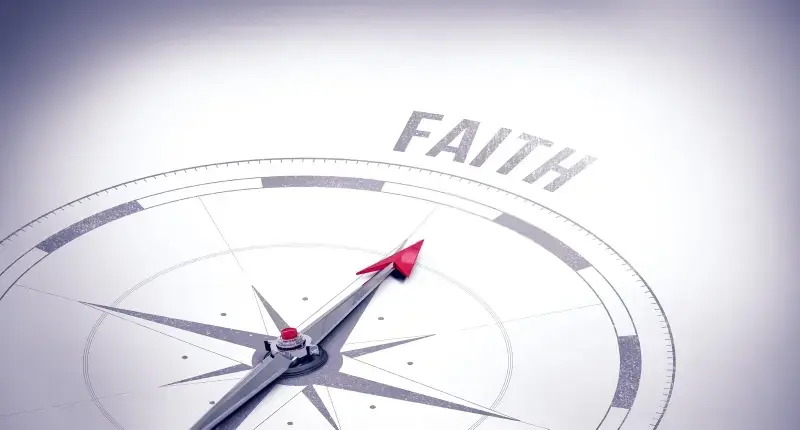THE FAITH COMPASS
- Charles
- 9 août 2025
- 4 min de lecture
Reflections on the Nineteenth Sunday in Ordinary Time - Wisdom 18:6-9; Hebrews 11:1-2, 8-19; Luke 12:32-48

Consider the quiet courage etched on the faces of those who endured the catacombs, whispering prayers while Roman soldiers marched overhead. Think of the countless believers across centuries and continents who faced persecution, imprisonment, and death, clinging to a promise they would not see fulfilled in their lifetime. Recall those in our own time who stand for justice, forgiveness, or truth in the face of overwhelming opposition, sustained only by a conviction deeper than the visible evidence of a better world. They did not see the immediate triumph of God’s kingdom. They did not witness the final vindication. Yet, they acted. They endured. They hoped. Why? Because they possessed faith. Today’s readings unveil this mysterious power, not as a passive belief, but as an active orientation, a compass guiding us by the unseen presence of God.
The first reading from the Book of Wisdom transports us to the dramatic night of the Passover. The enslaved Israelites stood poised for deliverance, yet still surrounded by the might of Egypt. “That night,” Wisdom tells us, “was known beforehand... with sure knowledge… so that... they might courageously wait”. They hadn’t yet crossed the Red Sea. Pharaoh’s chariots still thundered. Yet, they acted in faith. They slaughtered their lambs, marked their doorposts, and prepared to leave. How? They trusted God’s promise beyond their immediate, terrifying reality. Their faith wasn’t the absence of fear, but the presence of a deeper conviction that enabled courageous action before the deliverance was visible. They sensed the Unseen Hand acting, and they responded.
This is precisely the faith defined for us with breathtaking clarity in the second reading: “Faith is the realization of what is hoped for and evidence of things not seen”. Notice the dynamic tension: realization (hypostasis: substance, foundation, confident assurance) and evidence (elegchos: proof, conviction). Faith isn’t wishful thinking about a distant future; it’s the present participation/possession of the future promise, giving it substance now. It’s not the absence of proof, but a different kind of proof – the conviction born of encountering the reality of God, making the unseen as compelling as the seen.
Faith becomes the lens through which we perceive and interact with the world, the “evidence” that shapes our choices even when tangible proof is lacking. Abraham, the archetype of this lived faith, wasn’t given a map but a command: “Go!” He went, “not knowing where he was to go”. He lived as a stranger in the promised land, dwelling in tents, his eyes fixed on the “city with foundations, whose architect and maker is God”. Abraham’s life was a constant journey propelled by faith – stepping into the unknown, dwelling in the “not yet,” acting on the word of the Unseen God. His faith was his compass, his orientation, directing every step.
Jesus’ parable of the vigilant servants teaches us that this gift isn’t passive; it demands an active response, an orientation. The faithful servants aren’t passively waiting; they are working, managing the household, precisely because they know their ‘unseen’ master is coming. They sense his presence and authority even in his absence. Their faithful action flows from their conviction of his reality and his imminent return. The opposite is the servant who, thinking “My master is delayed in coming,” begins to act unjustly. This servant loses the sense of the master’s presence. The Unseen Reality fades, replaced only by the immediate and the selfish. His actions reveal his loss of faith, his loss of that inner orientation towards the master’s will and return.
Faith is not primarily about what we see with our eyes; it’s about the compass set in our hearts. It’s the “realization” of God’s promise – His love, His kingdom, His victory – making that future hope a present power. It’s the “evidence” of His unseen presence and faithfulness, convincing us more than passing circumstances. Like the Israelites, it calls us to courageous action now based on God’s promise. Like Abraham, it sends us on journeys into the unknown, trusting the One who calls. Like the faithful servants, it demands vigilance and diligent work because we know the Master is real, present in Spirit, and will return.
Faith is the parent praying over a sick child, trusting God’s love beyond the fever. It’s the worker acting with integrity when shortcuts seem easier, convinced of an ultimate accountability. It’s the community serving the poor, not just to alleviate suffering now, but as a sign of the Kingdom coming. It’s forgiving the seemingly unforgivable, believing in the power of grace over vengeance. It’s choosing hope in the face of despair because we have encountered the Unseen Love that conquers death.
Where does your compass point? When the tangible world presses in, when results are delayed, when the path is dark, do you sense the Unseen Master’s presence? Do you possess that “evidence of things not seen” that empowers action? Do you live with the “realization” of God’s promises giving substance to your hope? Let us pray for the grace of such faith – a faith that doesn’t wait to see before it acts, but acts because it already sees, with the eyes of the heart, the enduring presence and promise of our God. May we, like Abraham, set out. Like the Israelites, act courageously. Like the faithful servants, work diligently. For our Father is pleased to give us the kingdom. Do not be afraid. Amen.




Commentaires